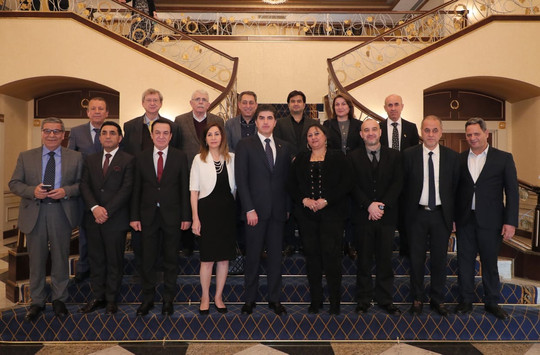More than 400 journalists have been killed since 2003 on the Iraqi territory. Many of them lost their lives fulfilling their duty to inform on the front line in the face of terrorism, but many have also been killed on the street or on their doorstep because their reports were considered embarrassing.
Despite contacts with the governments of Baghdad and Erbil in recent years, the figures for impunity for murderers of journalists remain scandalously high: less than one in 10 murders are still being investigated today. This is particularly true in Iraqi Kurdistan, in the north of the country.
Anthony Bellanger, General Secretary of the International Federation of Journalists (IFJ) reminded the President of the Kurdish region, Netchirvan Barzani, of this fact during a meeting at the presidential palace in Erbil. "Despite our efforts, despite our alerts, Iraq is one of the worst places for journalists in the world. We need strong actions today, a real political stand so that impunity is no longer the gangrene of our profession in your country."
Barzani said that he was "a strong defender of freedom of the press and freedom of expression and that he would continue his actions and work with Azad H. Amin, the President of the KJS, the Kurdistan Journalists Syndicate, an IFJ affiliate".
The IFJ General Secretary took the opportunity of this meeting to remind the Kurdish President that the IFJ encourages the creation of a regulatory body within the profession, as stipulated in Article 16 of the IFJ Global Charter of Ethics LINK , and welcomed the fact that this debate had taken place at an international conference in Erbil. "It is not possible, here and everywhere, that a Press Council or Supreme Media Council - including a press council, a press card commission etc - allows members of the government in its composition. These bodies must be independent, open to the public, with the participation of journalists and employers. No more, no less."
To illustrate the different practices in the Arab world and the Middle East, but also in Belgium and France, a large delegation of foreign journalists, trade unionists and researchers shared their rich experiences this week in Erbil, in order to provide serious guidelines for the future Iraqi Kurdish body.
Barzani has said he is open to any proposal on this subject and also relies on the KJS, which will have to work on its draft proposal in the coming weeks.

